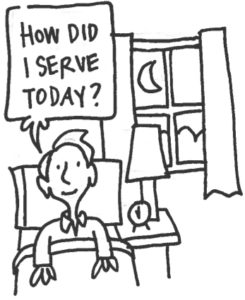Pastor the Community
The Son of Man came not to be served but to serve. —Mark 10:45
Jesus came to serve, and a relationship with him is deepened through commitment to service in the church and the neighborhood. He calls his disciples to go out into the world, proclaiming good news by word and example. A big part of that is knowing what God is up to in the neighborhood already, listening to the voices encountered there, entering into dialogue with those of other faiths. And it’s about working for justice and peace wherever you encounter the suffering and need of others.
Some basic steps in pastoring the community:
1. Elevate expectations for participation in service in the church and in the community
2. Build bridges to the local community
3. Make service a platform for sharing faith
Some examples of this best practice principle at work:
 1. Make it an expectation that everyone in the parish will do some kind of service. One parish was sponsoring a food drive with the slogan: “Everybody can”. They soon expanded that specific effort to say that everyone in the parish can be expected to offer some act of service, even if it is simply to pray for people in need.
1. Make it an expectation that everyone in the parish will do some kind of service. One parish was sponsoring a food drive with the slogan: “Everybody can”. They soon expanded that specific effort to say that everyone in the parish can be expected to offer some act of service, even if it is simply to pray for people in need.
2. Explicitly anchor current service projects in the Baptismal Covenant, in prayer, and in scripture. If you have a soup kitchen or a mission trip or a construction project, incorporate scripture and prayer in those gatherings. Ask different members of the service team to lead a brief time of prayer and scripture.
Testimonials:
This might be one of the most fun way we have grown as a community! Using Renewal works and Invite, Welcome, Connect, we decided to consider ourselves the community church and create opportunities to give pastoral care to the community. That has included a closer relationship with groups like the Scouts and inviting First Responders to an annual service to bless and thank them. We also get to bless their fire trucks and ambulances. We also have a large annual Christmas Tree burn that the whole town comes out for. —The Rev. Hillary Raining, Rector, St. Christopher’s Church
The survey has me thinking about what service means to us at our church – the spiritual work gave me the tools to think it through and one day I was reading a daily devotional book by Henri Nouwen, and on July 20 there it was. It’s entitled “who is my neighbor” and Nouwen talked about the Samaritan who crossed the road to take care of the poor man. The key is crossing the road and now I am thinking about what it means for individuals here at our church to cross the road to meet our neighbor. Service is not a passive thing, you have to walk across the street and meet someone who is suffering and who you might not understand. The focus on spiritual growth helped me do that. —Ms. Kitty Cole, Parishioner at The Church of the Holy Spirit, Lake Forest, Illinois
Additional examples and resources
1. Discover ways to learn what is going on in the neighborhood and around the world. Contact Episcopal Relief & Development to see how your congregation can support global initiatives. Use Episcopal Relief & Development resources in Lent.
2. Develop a partnership with a community of another faith or at least another denomination. Work on a service project together with that community.
3. Pertinent Forward Movement resources